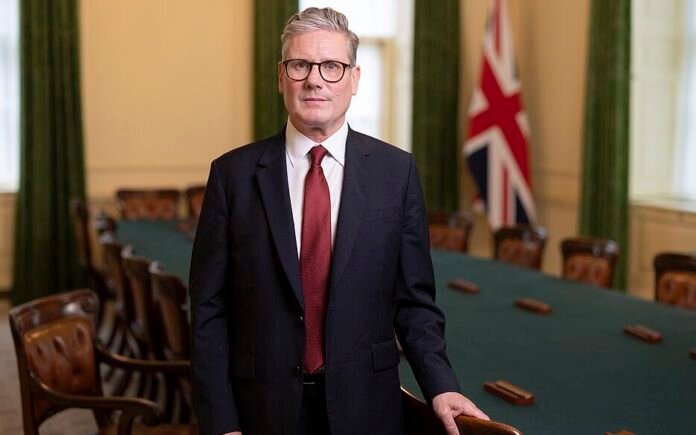PM confirms 2030 petrol car ban but softens EV targets as Trump’s tariffs shake UK auto sector
Sir Keir Starmer has confirmed the UK’s 2030 ban on new petrol and diesel car sales—but announced a raft of regulatory relaxations designed to help carmakers cope with mounting economic pressure following President Donald Trump’s shock tariffs.
Speaking from Derbyshire ahead of local elections, the prime minister said his government would make “bold changes” to protect British industry as it weathers Trump’s 25% tariff on imported cars and a further 10% duty on other products.
The measures come as Jaguar Land Rover said it would pause shipments to the United States in response to the new “trading terms.” The announcement sparked concern in Britain’s car manufacturing hubs and prompted ministers to move swiftly.
Although Labour’s manifesto pledge to restore the 2030 petrol and diesel car ban—rolled back to 2035 under Rishi Sunak—is now formally reaffirmed, Starmer has watered down surrounding electric vehicle (EV) rules to aid manufacturers in transition.
Firms that fail to meet government Zero Emission Vehicle (ZEV) sales targets will now face reduced penalties, while non-compliant manufacturers will find it easier to avoid fines altogether. The easing is designed to protect jobs and industrial output amid uncertainty over international trade flows.
Luxury brands such as Aston Martin and McLaren will be exempt from the ban, owing to their low production volumes. Petrol and diesel vans, along with hybrid models, will also continue to be sold until 2035.
Embed from Getty Images“Our automotive industry has taken a hit from global headwinds,” said Starmer. “I am determined to back British brilliance. Now more than ever, UK businesses and working people need a government that steps up, not stands aside.”
The US tariffs have rattled markets and jolted Downing Street into action, with Starmer’s team keen to present Labour as both green and pro-business. Transport Secretary Heidi Alexander described the new policy as an “ambitious package of strengthening reforms” that balances environmental goals with economic realism.
Mike Hawes, chief executive of the Society of Motor Manufacturers and Traders (SMMT), cautiously welcomed the move. “It’s clear government has recognised the intense pressure manufacturers are under,” he said, urging ministers to maintain “long-term clarity and competitiveness.”
Starmer’s announcement reflects a shift in tone—softening green mandates without scrapping them—to protect jobs and avoid political fallout in industrial constituencies. With Labour eyeing a majority and Trump looming large over global trade, the EV strategy looks set to become a central battleground in Britain’s economic debate.
BBC
The UK government has relaxed electric vehicle (EV) production rules to support car manufacturers ahead of the 2030 ban on new petrol and diesel cars. Transport Secretary Heidi Alexander confirmed that while the 2030 deadline remains, firms will be allowed greater flexibility to meet EV targets across multiple years. The move follows President Trump’s imposition of a 25% tariff on UK car imports to the US, a key export market. Fines for non-compliance have been reduced from £15,000 to £12,000 per vehicle. Prime Minister Keir Starmer announced £2.3 billion in tax breaks and investment in charging infrastructure to boost EV uptake. Smaller firms like Aston Martin and McLaren will be allowed to continue producing petrol cars, and some hybrids can remain on sale until 2035. Critics, including opposition parties, argue the reforms are insufficient to offset trade shocks or drive meaningful change in EV adoption due to cost and limited infrastructure.
THE INDEPENDENT
Prime Minister Keir Starmer will announce Labour’s “bold” plan to support Britain’s motor industry, reaffirming the 2030 ban on new petrol and diesel car sales despite economic pressure and U.S. tariffs imposed by President Donald Trump. The plan introduces flexibility to help the sector transition, including postponing the petrol and diesel van ban to 2035, reducing fines for missing electric vehicle targets, and allowing hybrid cars and low-volume luxury vehicles to remain in production until 2035. While Starmer frames the strategy as a response to global trade shifts and a commitment to net zero goals, critics argue the measures are insufficient. Conservatives warn that Labour’s tax hikes and lack of contingency planning will harm the industry further, and automotive leaders continue to urge for more government assistance. The announcement comes amid increasing concern about the competitiveness and future viability of the UK motor sector under mounting economic and regulatory challenges.
THE TELEGRAPH
Prime Minister Keir Starmer will exempt elite British carmakers like Aston Martin and McLaren from the 2030 petrol and diesel vehicle sales ban, easing net zero rules in response to Donald Trump’s 25% tariff on UK car exports. Small manufacturers producing under 2,500 cars yearly will escape the mandate entirely. Labour has also postponed the van ban to 2035 and broadened hybrid allowances. EV sales targets will now be more flexible, with reduced fines for missed quotas. The government hopes these changes will safeguard jobs and boost British industry amid global trade tensions. While welcomed by small manufacturers, critics argue the move weakens climate goals and risks favouritism. Rachel Reeves is pursuing a trade deal with India to offset US tariffs, while Starmer seeks to avoid a wider trade war through diplomacy with Canada and the EU. The policy shift marks part of Labour’s new “pro-growth” strategy amid fears of economic fallout.
